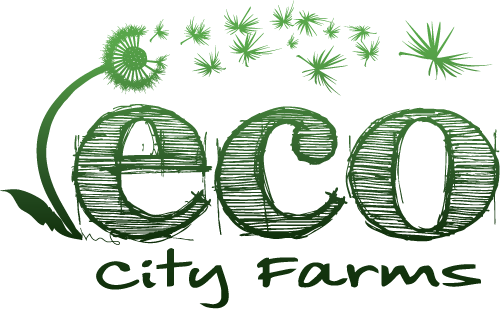“We Must Cultivate Our Garden”

We are very excited to introduce the new addition to the farm family – six chickens! ECO City farms is one of very few urban farms in our region to raise chickens. This is largely due to legal zoning issues regarding backyard poultry. Urban farms often do not enjoy the benefits of zoning exemptions that rural farmers have maintained. In Prince Georges County there is a growing movement to legalize backyard hens. PG Hens, a local advocacy group is part of a growing nationwide movement to bring food back into our cities.

Adam Schwartz, volunteer coordinator, has built a lovely chicken coop for our newest members! The coop is located underneath the existing solar panel structure to better utilize space and create a safe enclosed area that will keep the chickens happy. Now our rooster-statue has some company, as well.

Here are the six ladies! We are excited to share our experiences and demonstrate best practices to help others learn about what it takes to raise poultry. We are especially thankful to our partners at Park and Planning who made this possible and to Roy, our farmer trainee who donated the hens to get us started. As we learn and grow we hope to build our flock up to 30 hens and to operate a small egg CSA (Community Supported Agriculture). In the future perhaps we will add ducks and turkeys to our flock!

Roy and his daughter Chara raised the hens from chickhood, and so the chickens are very friendly and even follow people around.

Here are the boxes in which they lay their eggs daily. Spot the two eggs in the lower right corner!

Adam’s talents have also gone into building this vermiculture (worm compost) sifter. This is version 1.0, plans are to make it mechanized with a small motor. At this stage, it works best with two people working: one turns the sifter and the other shovels in compost.
Check out the sifter in action by clicking on the video below!

This is the vermiculture that goes into the sifter. This crude soil is what results after our worms have processed the the organic matter (rotten fruits and veggies from grocery stores and leaves from the city of Edmonston) that the farm receives regularly.

And here is the vermiculture after the leftover organic material and worms have been sifted out. What a difference! This incredible compost, rich in nutrients, is then sprinkled on our plant beds.

This is one of the systems used to keep the hoop houses warm during the winter. Passively aerated compost windrows (rows or piles of matter) release heat as they decompose. The plastic pipes placed horizontally in the windrows allow aeration of the compost and do away with the need to turn it, and so help keep the decomposition process going. Because winter is coming to an end, this is the last windrow we are going to have inside the hoop house (it will last another month or so).

This menacing looking instrument is helping us add azomite to the soil – a mineral derived from a volcano deposit in Utah. This organic fertilizer is a soil amendment, which enriches the soil with trace minerals. This application only needs to be done once.

Just-picked radishes.
We have a new buyer — the Takoma Park Food Co-op, located only 6 miles away from the farm. They have been buying our collards, kale, spinach and lettuce. Produce can also be bought directly from the farm on volunteer days. Everyone is welcome to help cultivate our gardens!
Peace,
the ECOcrew

